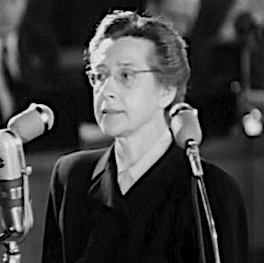The Hon. Milada Horáková, Ph.D.
The Honorable Dr. Milada Horáková (1901-1950) was born in Prague, and after graduating from Charles University with Ph.D. in law and philosophy, Horáková took a job with the city of Prague where she worked on issues of public housing and unemployment. She also became active in the Women’s National Council, a Prague-based association of women dedicated to promoting equal rights for women in Czechoslovakia. Both her job with the city and her involvement with the Women’s National Council influenced her perspectives on the social and political issues of the day. During the Second World War, Horáková became an active member of the resistance and helped create several women’s resistance groups. Arrested by the Gestapo in August 1940, she suffered 36 separate interrogations where she was beaten and tortured. She was eventually sent to Theresienstadt concentration camp. Following her release from prison and the end of the war, Horáková helped establish the Union of Political Prisoners and Survivors of Victims of Nazism. The group served as a support group for former prisoners. She would soon become a Member of Parliament and was elected as the head of the Women’s National Council. As head of the Council, she worked tirelessly to ensure that its communist members did not take control of the organization. In 1946, she was accused of “spreading untruthful reports” abroad by the communist secret police. However, she continued to be politically active and critical of the Communist Party. Following the communist takeover in 1948, Horáková resigned from Parliament. In September of 1949, she was arrested and charged with conspiracy against the state and framed as the leader of a plot to overthrow the communist government. Although she was beaten and tortured, Horáková refused to recant her views about the Communist Party. She was quickly sentenced to death in a widely publicized show trail.


